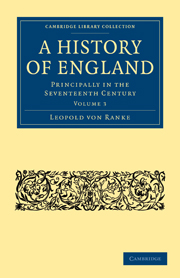Book contents
- Frontmatter
- Contents
- BOOK XI THE COMMONWEALTH IN ENGLAND, 1649—1653
- CHAP. I Republican ideas and institutions in England. The Levellers
- CHAP. II Rinuccini and Cromwell in Ireland
- CHAP. III Charles II and Cromwell in Scotland
- CHAP. IV Growth of the power of the Commonwealth by land and sea
- CHAP. V Dissolution of the Long Parliament
- CHAP. VI The Little Parliament
- BOOK XII THE PROTECTORATE OF OLIVER CROMWELL, 1653–1658
- BOOK XIII FALL OF THE PROTECTORATE AND THE COMMONWEALTH. RESTORATION OF THE MONARCHY, 1658—1660
- BOOK XIV THE FIRST FIVE YEARS UNDER CHARLES II. THE RESTORATION OF THE ANGLICAN CHURCH
- BOOK XV THE DUTCH WARS OF CHARLES II. ESTABLISHMENT OF THE PROTESTANT AND PARLIAMENTARY CHARACTER OF THE CONSTITUTION 1664—1674
CHAP. IV - Growth of the power of the Commonwealth by land and sea
Published online by Cambridge University Press: 07 June 2011
- Frontmatter
- Contents
- BOOK XI THE COMMONWEALTH IN ENGLAND, 1649—1653
- CHAP. I Republican ideas and institutions in England. The Levellers
- CHAP. II Rinuccini and Cromwell in Ireland
- CHAP. III Charles II and Cromwell in Scotland
- CHAP. IV Growth of the power of the Commonwealth by land and sea
- CHAP. V Dissolution of the Long Parliament
- CHAP. VI The Little Parliament
- BOOK XII THE PROTECTORATE OF OLIVER CROMWELL, 1653–1658
- BOOK XIII FALL OF THE PROTECTORATE AND THE COMMONWEALTH. RESTORATION OF THE MONARCHY, 1658—1660
- BOOK XIV THE FIRST FIVE YEARS UNDER CHARLES II. THE RESTORATION OF THE ANGLICAN CHURCH
- BOOK XV THE DUTCH WARS OF CHARLES II. ESTABLISHMENT OF THE PROTESTANT AND PARLIAMENTARY CHARACTER OF THE CONSTITUTION 1664—1674
Summary
The authority of the Commonwealth was now supreme in the three kingdoms: everywhere it had overpowered, at the very moment when they were anxious to be reconciled to each other, the two forces between which the war had originally broken out, that of the royal authority and that of local, parliamentary or religious independence. In England the Parliamentary party with its Presbyterian impulses was ruined from the time that it attempted to make its peace with Charles I. In the same way Scotland was conquered just when the strict Covenanters had made such an agreement with Charles II as could satisfy them. The moment in which they imagined that they had for ever ended their old quarrel with the monarchy, and with the episcopacy which it protected, brought about their ruin. In Ireland the hostility between the Protestant and the Catholic population was in the greater part of the country as good as laid aside at the moment when Cromwell crushed them both. It is impossible not to see that it was above all things the fear of the preponderance of the Republican faction which evoked those approaches to union, approaches which did not lead to any deeper reconciliation, precisely because they were merely brought out under the pressure of this sentiment. The result was that the predominance which it was wished to avoid, now first became fully evident.
- Type
- Chapter
- Information
- A History of EnglandPrincipally in the Seventeenth Century, pp. 58 - 70Publisher: Cambridge University PressPrint publication year: 2010First published in: 1875

